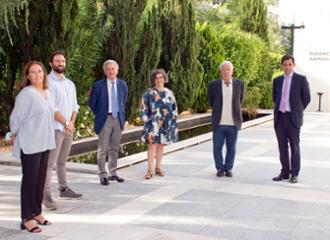Research projects
Start of main content
Quality of the education system, composition of educatiosn and economic growth
8th National Competition for Economic Research Grants
Macroeconomics
Research Centre or Institution : Universidad de Valencia.
Abstract
The objective of this project was to investigate how the quality of the education system can influence decisions to invest in higher education (secondary and tertiary), which can in turn affect the development of economies. The analysis framework is a general equilibrium model with overlapping generations in which the source of growth in the economy is the accumulation of physical and human capital. The economy is characterised by the output per worker and the evolution of this variable depends on the quality of the education system. Given the quality of the education system, individuals optimally decide how much to invest in education, taking into account their abilities. The results of the model show two channels through which the quality can affect the accumulation of human capital. On the one hand, a low-quality education system acts as a barrier to the entrance of investment in higher education (extensive channel). On the other hand, once individuals decide to invest in higher education, the higher the quality of the education system, the greater the investment in secondary and tertiary education made by each individual (intensive channel). Using data on the results of internationally comparable examinations among students of secondary education age and the rankings of universities, the empirical evidence shows that the channels are quantitatively important. In particular, other factors remaining constant, the countries with the highest quality education systems have a higher percentage of the population with secondary and university studies. In addition, monitoring the education stock, a greater quality of the education system implies greater investment in education, measured by an increase in secondary and university enrolment rates and the average number of years of secondary and tertiary education. Finally, in the estimation of a standard growth equation, it is shown that, in line with the implications of the theoretical model, the positive effect of the quality of the education system is found only when the quality of the education is relatively high, which suggests that quality does not affect growth unless the students acquire a minimum level of knowledge.
-
 Activities related
Activities related
-
 Projects related
Projects related
-
 News related
News related
-
 Publications related
Publications related
-
 Thesis related
Thesis related
 Activities related
Activities related
-
25
Oct
2023
Conference The quest for efficiency in higher education: Experience from England and the UK over 5 decades Wednesday 25, October 2023, 9:30 hours
-
15
Apr
2024
Conference La economía española: una mirada al pasado. In memoriam: Pedro Tedde de Lorca Madrid, Lunes, 15 de abril de 2024, 19:30 horas
-
18
Nov
2024
Conference Richer and More Equal: A New History of Wealth in the West Madrid, Lunes 18, de noviembre de 2024, 19:00 horas
 Projects related
Projects related
- Evaluation of efficiency in educational production from sample designs 2016 Senior Researcher : Juan Aparicio Baeza Research Centre or Institution : Universidad Miguel Hernández de Elche. Alicante.
- Remedial education in a context of growing inequalities: on the impact of the Program for School Guidance in Spain on non-cognitive skills 2017 Senior Researcher : María Luisa Hidalgo Hidalgo Research Centre or Institution : Universidad Pablo de Olavide. Sevilla.
- Measuring educational equity in Spain and the OECD: a multidimensional analysis using composite indicators 2020 Senior Researcher : Gabriela Sicilia Research Centre or Institution : Universidad de La Laguna
 News related
News related
-

Solo el 38% del profesorado de secundaria ha recibido formación en tecnología
Published on 09/22/2020
 Publications related
Publications related

Indicadores comentados sobre el estado del sistema educativo español. 2024
2024 Indicadores sobre educación
El tratamiento de la diferencia y de las necesidades educativas. Un estudio pedagógico
2024 Papers on Education
 Thesis related
Thesis related
- Multigenerational Inequality in Spain Senior Researcher : Andrea Pîzzo Research Centre or Institution : Universidad Carlos III de Madrid.
End of main content




